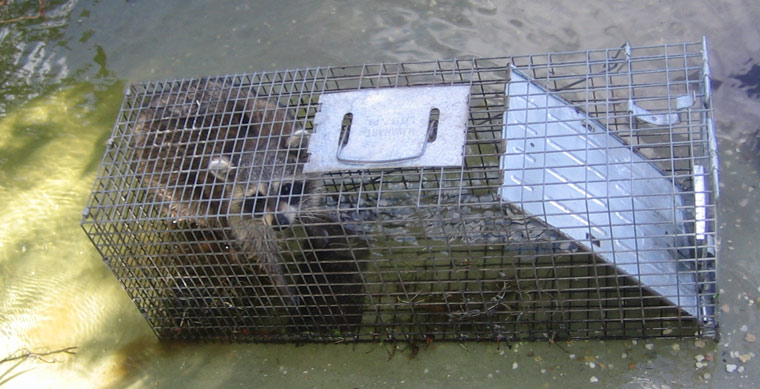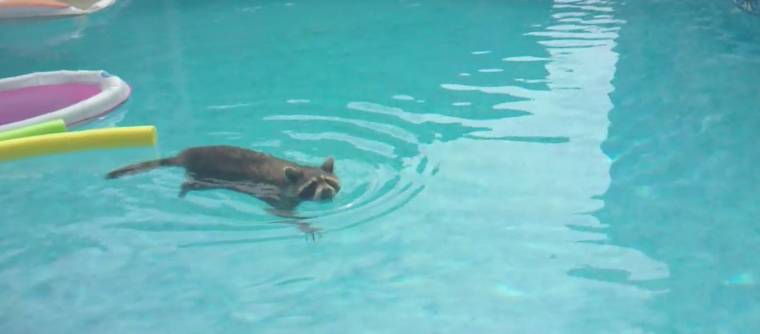-
info@aaanimalcontrol.com
Call us for help in your town
Humane Wildlife Education
Do raccoons swim?
Need raccoon removal in your hometown? We service over 500 USA locations! Click here to hire us in your town and check prices - updated for year 2020.
Raccoons can swim, and they do swim rather well. In fact, it would seem that raccoons are creatures of many talents, with many of them much smarter than most humans would ever give them credit for. It has already been proven that raccoons living in the heart of big cities tend to be smarter than those that live in more rural backdrops. Raccoons have now learned how to open doors, pop open latches on windows, and even sneak into garbage cans … with latches and ties! They’re determined little critters, and they won’t give up without a fight when they find something they deem worthy of fighting for. If they find a food source, for example, they will continue to try to get to that food source unless it has exhausted EVERY available method. Raccoons can work on the same problem for many hours until they finally solve it.

Raccoons love water. In “the wild” they would choose to live close to water. A lake, for example, would provide plenty of insects and smaller animals that the raccoon could prey on, plus there’s a steady source of fresh drinking water that they can also use to groom themselves. On top of that, you will find trees around lakes / water sources usually, and these provide homes and shelter for the raccoon, especially when it is being chased by a scavenger.
It is not unusual to find raccoons swimming in your swimming pool, if you’re lucky enough to have one, and some of you may even have spotted them splashing around in your fish pond too. The raccoons will eat your fish, given half a chance, but they’re quite lazy … They’d much rather opt for an easier snack, such as insects, or a slow fish that doesn’t require much chasing.
You will more than likely find raccoon poop if you have a raccoon in your garden alongside a pool or a pond. They like to poop in ponds. In case you weren’t aware, the scientific name for the humble raccoon is “procyon lotor”, and this translates roughly to “washed with water”. If you’ve ever seen a raccoon eat, it will dunk the food in water to make it softer. It looks as though the animal is washing their hands / the water, however, and this is what has earned them the name.
If you have a rogue raccoon enjoying your pool more than you are, and leaving a small deposit while they’re there, it’s time to take action. Making your pond or pool raccoon-proof is relatively simple, and it’s an easy case of making the steps really difficult to access. Razor or chicken wire can work. The raccoons tend to walk into the water via the steps, leaving their small deposit on the step themselves. If you can stop them from getting to it, you can stop them from doing the disgusting business. Plus, you really don’t want to share your pool with any wild animal, and definitely not a raccoon. Their urine and fees are well known to carry and transit a wide range of diseases, and the contaminated pool water will get in your ears, eyes, nose and mouth.
Raccoons really do love water, so make sure your home is safe. Give us a call today to find out how we can make your ponds or pools much less attractive to animals just like rodents.
How to Stop Raccoons Using My Pool as a Toilet
Need raccoon removal in your hometown? We service over 500 USA locations! Click here to hire us in your town and check prices- updated for year 2020.
Finding anything other than water in your pool isn't a pleasant experience, and it's an especially awful experience when the thing you're faced with is feces left by a wild animal. What doesn't help, of course, is that the poop of some wild animals can look very much like the poop that your cat or (small/medium-sized) dog might leave in the back yard. Raccoon poop, also known as skat, is very similar to cat poop, and many homeowners are quick to blame their own or a neighbor's pet before they think to blame a passing wild raccoon.

If you have raccoon poop in your pool once, there's a good chance that same raccoon will be back, no matter how many times you shoo it away. It gets worse too; raccoons will tell their friends and family members where these cool places to hang out are. Mother raccoons will share warm and safe nesting/den sites with her own children, alongside the location of really good spots to find a good meal. Mother raccoons will also come together during the cold, winter months, and they will share these titbits with each other too.
By shooing a raccoon away, all you are doing is shooing it away for a brief period of time. A raccoon that poops in your pool once will do it again and again and again, and the reason for this is because you keep giving it the opportunity to do what it wants. Food will encourage the animal closer in the first place, and a warm, safe home will be the thing that keeps them hanging around, alongside that great source of food. They love to play in water, elegantly displayed by hundreds of videos that end up going viral across social media platforms, and when you have a shallow end or some steps that lead in, that's where you'll find the poop. They don't tend to do it so much in the deeper areas.
How to Stop a Raccoon Using My Pool as a Toilet
Step One: Food Removal
The first step is to eradicate all sources of food. Have a look in your garden and note down everything that the raccoon — an opportunistic hunter/feeder and a scavenger — could eat. This might mean trash bags, bird feeders, fruit trees, pet food bowls, fish food, chicken feed, vegetables and other plant life that you have growing in your back yard, etc.
Insecticides will help to keep insect populations low in your lawn and other garden areas, and these can help to stop raccoon invasions. You may not wish to use this approach if you are opting for something all-natural.
Ponds are another source of food for raccoons. Where possible, cover over fish ponds at night (raccoons are nocturnal).
Step Two: Area Obstacles
When you know that raccoons like to poop in the shallow areas of the pool, you could try to cordon that area off. You may just find, like other homeowners, that sealing off the steps/shallow area of the pool from the raccoon works to keep the animal out of the pond period. They are quite lazy animals really; they won't work too hard when there's an easier option somewhere close by.
Making it difficult for a raccoon to get to a specific area is a really great way to discourage the animal from coming closer. A fence around the perimeter of your land will go some way to keeping larger wild animals at bay and, therefore, away from your pool.
Step Three: Raccoon Repellents
Repellents aren't a great idea because of the majority of them simply do not work. You can try using lights, ultrasonic noise devices, granules and liquid-based deterrents, but these have proven themselves to be mostly ineffective. Some homeowners do swear by them, but we personally can't endorse them.
There is just one type of repellent for raccoons that we would recommend you try and that's wildlife eviction fluid. This all-natural repellent is created from various fluids that come from male raccoons and other males animals, such as foxes, coyotes, etc. These males are predators to females, not for them; for their youngsters. Male raccoons, plus both sexes of other predators will attack and consume young raccoon kits in the den, especially if they have been left defenceless by a mother who has gone out to find food.
Step Four: Wildlife Removal Experts
Known by a string of names, including wildlife rehabilitators, pest control officers, and wildlife technicians, these removal experts have a plethora of tricks up their sleeves, usually accumulated over years of safely and humanely removing wild animals from residential and commercial properties. A problematic raccoon or a raccoon that seems to be sick may need to be euthanized. Wildlife rehabilitators are usually the only individuals who are permitted to this, depending on the state or area. In some places, raccoon removal requires rather specific methods, with permit and license acquisition beforehand too.
For more information, you may want to click on one of these guides that I wrote:
How much does raccoon removal cost? - get the lowdown on prices.
How to get rid of raccoons - my main raccoon removal info guide.
Example raccoon trapping photographs - get do-it-yourself ideas.
Raccoon job blog - learn from great examples of raccoon jobs I've done.
raccoons in the attic


















